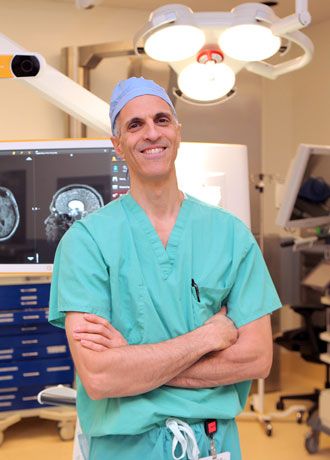
Dr. Mark Souweidane, director of pediatric neurosurgery at Weill Cornell Medicine
Dr. Souweidane’s pediatric neurosurgery research lab, which is part of the Children's Brain Tumor Project, is focused on the promise of local delivery in treating brain tumors in children. Local delivery overcomes a major limitation in treating pediatric brain tumors, which has been the inability to achieve adequate levels of a therapeutic agent within the tumor. This problem is due to the presence of what’s called the blood-brain barrier (BBB), which is the body’s way of protecting the brain from toxins in the blood.
In a healthy child, the BBB forms a protective shield against blood-borne toxins. In a child with a brain tumor, though, it makes treatment difficult: Chemotherapy puts cancer-fighting drugs into the bloodstream, but the blood-brain barrier blocks most of it from getting to the tumor itself. Delivering a higher dose of medicine into the blood stream gets more of it across the BBB, but that dosage is more toxic to the child. Local delivery — getting the drug directly to the tumor without going through the bloodstream — gets high concentrations of a therapeutic agent to the tumor without risking the high toxicity of conventionally delivered chemotherapy.
Dr. Mark Souweidane’s laboratory is investigating a promising local delivery method as a potential form of therapy for children with inoperable brain tumors: Interstitial infusion, also called convection-enhanced delivery (CED). This route of delivery holds particular promise for children with the brainstem glioma called diffuse intrinsic pontine glioma (DIPG), a form of brainstem tumor in children that currently has no effective therapy and universally is fatal.
Dr. Souweidane’s laboratory has gained national recognition in establishing the feasibility of using interstitial infusion for treating children with brain stem gliomas, and in 2012 Dr. Souweidane received FDA approval for a Phase I clinical trial for CED. The trial focused upon the safety, the distributive properties, and the radiographic correlates of interstitial delivery in the brainstem; the results were published in Lancet Oncology in 2018, with multiple subsequent papers with related findings. (Find out more about the DIPG clinical trial.)
In addition to the mechanical considerations of local delivery, Dr. Souweidane’s laboratory is also investigating the use of a number of different therapeutic compounds. By using a variety of therapeutic agents, laboratory researchers can study the toxicity of direct interstitial. Conventional chemotherapeutic compounds, conjugated immunotoxins, and radiolabelled monoclonal antibodies are all in different phases of preclinical investigation.
Medical students, neurosurgery residents, and postdoctoral fellows have all participated in Dr. Souweidane’s laboratory, and their efforts have been critical to the function of the lab.
Children's Brain Tumor Project
Dr. Souweidane's research is a part of the Children's Brain Tumor Project at Weill Cornell Medicine Pediatric Neurosurgery. More about the Children's Brain Tumor Project

